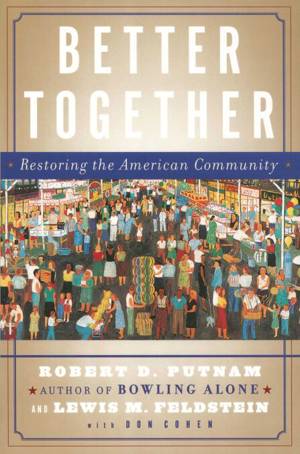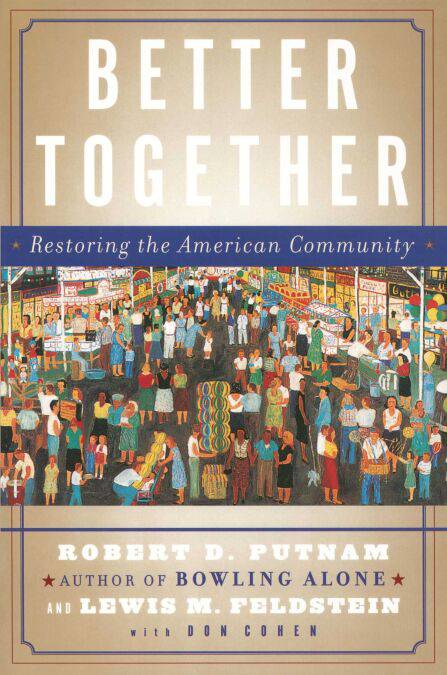
- Retrait gratuit dans votre magasin Club
- 7.000.000 titres dans notre catalogue
- Payer en toute sécurité
- Toujours un magasin près de chez vous
- Retrait gratuit dans votre magasin Club
- 7.000.0000 titres dans notre catalogue
- Payer en toute sécurité
- Toujours un magasin près de chez vous
Better Together EBOOK
Restoring the American Community
Robert D. Putnam, Lewis Feldstein, Donald J. Cohen
Ebook | Anglais
16,76 €
+ 16 points
Format
Description
In his acclaimed bestselling book, Bowling Alone: The Collapse and Revival of American Community, Robert Putnam described a thirty-year decline in America's social institutions. The book ended with the hope that new forms of social connection might be invented in order to revive our communities.
In Better Together, Putnam and longtime civic activist Lewis Feldstein describe some of the diverse locations and most compelling ways in which civic renewal is taking place today. In response to civic crises and local problems, they say, hardworking, committed people are reweaving the social fabric all across America, often in innovative ways that may turn out to be appropriate for the twenty-first century.
Better Together is a book of stories about people who are building communities to solve specific problems. The examples Putnam and Feldstein describe span the country from big cities such as Philadelphia, San Francisco, and Chicago to the Los Angeles suburbs, small Mississippi and Wisconsin towns, and quiet rural areas. The projects range from the strictly local to that of the men and women of UPS, who cover the nation. Bowling Alone looked at America from a broad and general perspective. Better Together takes us into Catherine Flannery's Roxbury, Massachusetts, living room, a UPS loading dock in Greensboro, North Carolina, a Philadelphia classroom, the Portsmouth, New Hampshire, naval shipyard, and a Bay Area Web site.
We meet activists driven by their visions, each of whom has chosen to succeed by building community: Mexican Americans in the Rio Grande Valley who want paved roads, running water, and decent schools; Harvard University clerical workers searching for respect and improved working conditions; Waupun, Wisconsin, schoolchildren organizing to improve safety at a local railroad crossing; and merchants in Tupelo, Mississippi, joining with farmers to improve their economic status. As the stories in Better Together demonstrate, bringing people together by building on personal relationships remains one of the most effective strategies to enhance America's social health.
In Better Together, Putnam and longtime civic activist Lewis Feldstein describe some of the diverse locations and most compelling ways in which civic renewal is taking place today. In response to civic crises and local problems, they say, hardworking, committed people are reweaving the social fabric all across America, often in innovative ways that may turn out to be appropriate for the twenty-first century.
Better Together is a book of stories about people who are building communities to solve specific problems. The examples Putnam and Feldstein describe span the country from big cities such as Philadelphia, San Francisco, and Chicago to the Los Angeles suburbs, small Mississippi and Wisconsin towns, and quiet rural areas. The projects range from the strictly local to that of the men and women of UPS, who cover the nation. Bowling Alone looked at America from a broad and general perspective. Better Together takes us into Catherine Flannery's Roxbury, Massachusetts, living room, a UPS loading dock in Greensboro, North Carolina, a Philadelphia classroom, the Portsmouth, New Hampshire, naval shipyard, and a Bay Area Web site.
We meet activists driven by their visions, each of whom has chosen to succeed by building community: Mexican Americans in the Rio Grande Valley who want paved roads, running water, and decent schools; Harvard University clerical workers searching for respect and improved working conditions; Waupun, Wisconsin, schoolchildren organizing to improve safety at a local railroad crossing; and merchants in Tupelo, Mississippi, joining with farmers to improve their economic status. As the stories in Better Together demonstrate, bringing people together by building on personal relationships remains one of the most effective strategies to enhance America's social health.
Spécifications
Parties prenantes
- Auteur(s) :
- Editeur:
Contenu
- Nombre de pages :
- 336
- Langue:
- Anglais
Caractéristiques
- EAN:
- 9781439106884
- Date de parution :
- 30-11-09
- Format:
- Ebook
- Protection digitale:
- Adobe DRM
- Format numérique:
- ePub

Les avis
Nous publions uniquement les avis qui respectent les conditions requises. Consultez nos conditions pour les avis.






